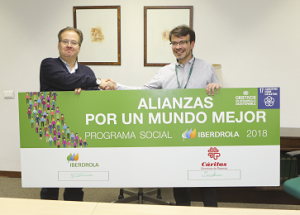Iberdrola is collaborating through its Foundation with the charity Cáritas Diocesana de Plasencia in a project that forms part of Iberdrola’s Social Programme, promoting initiatives to overcome poverty and social exclusion and improve the quality of life of the most vulnerable.

It is estimated that the company’s collaboration in this social project directly benefits the more than 70 people who use the centre daily.
The aim of this collaboration is to improve the charity’s soup kitchen and food distribution point, providing it with the means and tools needed to improve its daily service and the coordination between volunteers and technical staff. The project will also provide, coordinate and organise a series of support resources and services for the users of this centre, increasing their autonomy and social integration.
It is estimated that the company’s collaboration in this social project directly benefits the more than 70 people who use the centre daily. Out of these, special attention is paid to about twenty children and adolescents through tasks to support and monitor them.
Every year Iberdrola supports around thirty social projects in Spain through its Spanish foundation. Thanks to this Social Programme, since 2010 over 300 projects have been supported, with an annual average impact of 12,000 direct beneficiaries and 32,000 indirect beneficiaries. In addition, these projects also encourage voluntary work and contribute to job creation.
In the specific case of Extremadura, over the past seven years Iberdrola has instigated 13 projects with charities from both provinces, representing a total investment of about 450,000 euros.
Through this Social Programme, Fundación Iberdrola contributes to attaining the sustainable development goals (SDG) defined by the United Nations Agenda 2030, which have been integrated into its business strategy. This aid helps the company to focus its efforts on meeting goals 1 (no poverty), 3 (good health and well-being), 4 (quality education), 5 (gender equality) and 10 (reduced inequalities).
